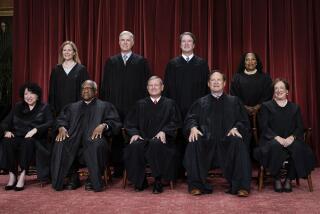Sununu Travel Policy Violations Cited in Report
- Share via
WASHINGTON — White House Chief of Staff John H. Sununu violated Administration policy governing the use of military aircraft several times and has been required to reimburse the government several hundred dollars for improper charges, White House counsel C. Boyden Gray said in a report issued Thursday.
The amounts Sununu has had to repay do not reflect the full cost to the government of his travel. He is billed at a rate equivalent to the price of a commercial coach ticket rather than the $3,945 per hour cost of flying the plane, a military version of the Gulfstream executive jet.
At the same time, President Bush issued a new travel policy that will require Sununu to receive Gray’s permission before using military aircraft in the future. The White House national security adviser also is covered by the policy but it does not affect travel by any other Administration officials, such as Vice President Dan Quayle or Cabinet members.
The new policy forbids the use of military planes for travel to a political event unless explicitly authorized by the President. It bars use of military planes for personal trips except in the case of “immediate or compelling need,” such as the “serious illness of a close relative.”
Central to Gray’s report is the question of “mixed” trips--those that include both an official and an unofficial purpose.
Sununu had claimed that the government should pay the full cost of his travel for any trip that had at least one “official” event, such as a speech, regardless of how much of the trip actually was devoted to non-official business.
At the time the trips were taken, that practice was “inconsistent with existing policy for senior Administration officials,” as set out in several memorandums from the counsel’s office, Gray noted. Sununu’s practice violated “two fundamental principles of appropriations law” that are designed to ensure that taxpayer funds are spent only on official purposes as designated by congressional appropriations.
Gray, nonetheless, exonerated Sununu from intentional violations of the law, saying that his breaches of the rules resulted “from an innocent misunderstanding.” The report provides no specific support for that conclusion.
Gray cited seven trips that violated the government’s rules. Two involved personal travel--a previously undisclosed visit to his dentist in June, 1990, and travel to a ski weekend in New Hampshire earlier that year.
For the trip to the dentist, Sununu will be required to pay $240, and for the ski trip $338. The ski trip cost the government $9,862, not including the salaries of the crew, according to records of the White House military office released with the report. The cost of the trip to the dentist was about $2,000, the records indicate.
Sununu justified the cost of the ski trip on the grounds that he was participating in a charitable event--the ski weekend raises money for an educational foundation--and that charities further Bush’s “Points of Light” policy.
But, Gray wrote, “it cannot be the case that any federal official’s participation in a particular charitable activity of his choice” can be justified on that ground.
In most cases Sununu has paid the money not from his own pocket but from a campaign fund in New Hampshire that the former New Hampshire governor controls. Under New Hampshire law, that money--$230,000, as of Sununu’s last disclosure statement--can be used for any purpose Sununu wishes, although it was raised for his 1986 reelection campaign.
In addition to the improper personal trips, Gray also ruled that in five cases Sununu improperly deemed political travel to be official. Republican Party committees have been billed for the additional amounts.
In four other cases, however, Gray determined that Republican Party committees had been overbilled for Sununu travel and should be partly reimbursed.
Presidential aides, who have been taken aback by Sununu’s handling of the issue, declined to predict whether the report and the new policy would put an end to the controversy surrounding the chief of staff. But “at least it gives us a new direction from the President’s standpoint, a policy that eliminates any appearance of impropriety,” White House Press Secretary Marlin Fitzwater said.
The new policy undermines the rationale that the White House earlier had been using for Sununu’s use of military planes--that Bush believed the planes were needed in all cases for reasons of communications and security.
According to the new policy statement, Bush believes that the use of military planes is needed in “many instances.” But the policy directs that commercial planes be used unless “security, communications or scheduling needs” require a military plane. That decision will be made “on a case-by-case basis.”
In fact, a senior White House official said, Bush had never been aware of the White House policy on the use of planes, or of Sununu’s extensive use of military planes until the matter became public. “He was surprised by much of it, by the use of the planes, the policy itself,” the official said.
Under the old policy, Sununu was allowed to use a plane whenever he deemed it proper but was required to reimburse the government for personal or political travel. The government picks up the full cost of official travel.
Sununu was out of town much of the day giving a commencement speech--to which he traveled by military plane. He said in an interview with United Press International that he had never worried about losing his job over the issue.
“No, no, not at all,” he insisted. Bush, he said, had told him: “ ‘don’t let it get you down. It’ll all be fine.’ ”
In a statement released with the new policy, the chief of staff claimed that Gray’s report completely exonerates him. Partly quoting a sentence from the report, Sununu wrote that he was “pleased” that Gray “has concluded that ‘these trips were properly classified . . . and appropriate reimbursements have been made.’ ”
The full sentence from the beginning of Gray’s report reads: “It is our view that the answer to whether these trips were properly characterized and whether appropriate reimbursements have been made is essentially yes.”
Gray’s report and accompanying documentation also disclosed that an earlier report issued by Sununu had considerably overstated the amount that the chief of staff already had reimbursed the government for his trips.
In several cases, Sununu had taken guests along with him on trips, all of whom had been billed. But when he released details of his trips last month after public controversy began over his travel, Sununu had lumped together all the payments, whether made by him or by others. In only one case did his accounting disclose the fact that others, outside his immediate family, had been on the trip.
In addition to the improper trips, the report also notes that two other trips, ski weekends in Colorado where Sununu gave several talks, complied with White House policy at the time but only because that policy allowed “high-level White House officials (to) determine for themselves whether it is in the interests of the White House to attend a particular event.”
In addition, the report found that on at least three occasions Sununu obtained reimbursement for travel expenses from private organizations in violation of federal rules. Those payments did not “violate any substantive ethics laws or regulations” because Sununu “corrected the erroneous payment” before Gray’s office made its review, the report said.
But in at least one of those cases, the “corrected” payment was made only after the issue of Sununu’s travel became public. The dates of the other two corrections were not disclosed in the report.
The one case in which the date is known involved the American Ski Federation and Ski magazine, which paid for Sununu’s meals and lodging and his wife’s travel to a ski industry conference in Aspen, Colo., in December, 1990. Ski magazine is owned by the Times Mirror Co., which also is the corporate parent of The Times.
Federal law allows a government official to receive reimbursement for travel expenses from private organizations only if they are charities. After the issue became public, the Ski Federation and the magazine arranged for another group, the Ski Educational Foundation of the Ski Industry Assn. to pick up the cost. The foundation is a charity.
“The people at Ski magazine who handled this were certainly not aware of what the federal ethics rules are on something like this,” said Linda Wallen, speaking for Times Mirror Magazines.
More to Read
Sign up for Essential California
The most important California stories and recommendations in your inbox every morning.
You may occasionally receive promotional content from the Los Angeles Times.











